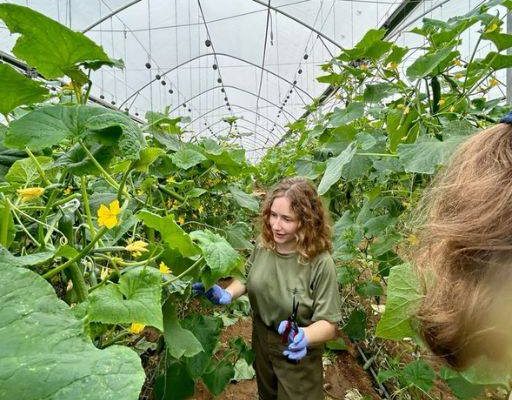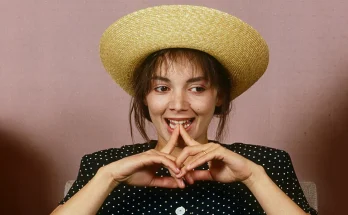When I told people I worked in a greenhouse, most gave me the kind of smile you reserve for kids selling lemonade—charming, harmless, forgettable. Some would nod, toss me a “That’s so cool!” before launching into something more palatable, like real estate or app development. But when I told Lena, my college roommate turned Manhattan marketing manager, she laughed. Not a chuckle, not a smirk—a full, head-thrown-back, nose-wrinkled laugh.
“Wait,” she said between sips of her $7 cold brew, “like… with plants?” Her blazer probably cost more than my month’s utility bills. “I just didn’t think you’d end up in the dirt after all that degree drama.”
She said it with that polished, performative grin. The kind that sparkles on social media but doesn’t reach the eyes.
“Actually,” I said, keeping my voice calm, “I run a company now. Organic produce. Local distribution. We grow everything from heirloom tomatoes to edible flowers.”
She took another sip and raised a perfectly shaped eyebrow. “God, I love that. You really stuck with the whole earthy-crunchy thing. So different from my world—we’re all chasing high-dollar clients in tech and finance now.”
I let her talk. She always did like the sound of her own voice. The last time we’d really hung out was graduation day, five years ago, when she swore we’d keep in touch. Instead, I got the occasional emoji reaction on Instagram and that one birthday text that felt copied and pasted.
But here she was now, boasting about her firm’s expansion into “sustainable branding,” something she called real roots storytelling, whatever that meant. I kept my smile neutral, the way I’d learned to do with clients who try to talk over your expertise.
Then, casually, like tossing a bone to a dog, she said, “You don’t happen to know anyone in food production who might be a good fit? We’re dying to land a major name in the local organics space. Huge demand.”
I reached into my jacket pocket and pulled out a clean business card—matte finish, deep forest green with cream lettering—and slid it across the table.
She picked it up, read it once, and blinked. “Wait—this is your company?”
“Yep,” I said, leaning back. “Biggest organic producer in the region. We supply half the co-ops and specialty grocers in a five-county radius. Just signed a deal with that new zero-waste meal kit startup everyone’s talking about.”
I could see the gears turning behind her eyes—recalculating her previous assumptions in real-time.
“I’d be open to signing with your firm,” I added, “but there’s one condition.”
She straightened, professional instincts kicking in. “Name it.”
“You spend a week with me. In the greenhouses. No shortcuts. You learn what our ‘dirt’ actually grows.”
Lena showed up Monday morning at 6:45 a.m. in yoga pants and brand-new hiking boots that still had the tag on one lace. Her SUV idled in the gravel lot like it didn’t want to be there either.
“This is earlier than I thought,” she muttered, squinting at the rising sun.
I handed her a pair of gloves. “Plants don’t care about your time zone. Let’s go.”
The first hour broke her. She winced at the smell of compost and gagged when a slug crawled onto her boot. She asked if we had Wi-Fi in the barn. I pretended not to hear.
By lunchtime, her white hoodie had developed a constellation of green stains and something I’d bet money was goat drool.
“Is this really necessary?” she asked as we unloaded trays of microgreens. “I mean, I get the vibe. I just don’t think our clients need me… you know… elbow-deep in kale.”
I pointed to the clipboard in her hand. “That kale goes to restaurants in the city. If you want to sell our story, you should know the story. These aren’t aesthetics—they’re livelihoods.”
She didn’t argue, but she didn’t smile either.
On Wednesday, I caught her staying late. She was reorganizing the herb inventory in the shade tunnel, muttering about inconsistencies in the handwritten labels. When I brought her a thermos of my homemade mint tea, she looked up, surprised.
“This actually isn’t bad,” she said, taking a sip.
“You say that like you expected poison.”
She laughed—genuinely this time.
By Friday, she’d learned how to properly transplant lettuce plugs, knew the difference between basil and Thai basil, and even got into a spirited debate with an intern about seedling rotation schedules. She was still Lena—ambitious, sharp-tongued, always angling for the best shot—but something had softened.
“I had no idea how much work goes into this,” she said as we watched the sunset from the greenhouse steps. “I mean, I thought I knew, but…”
“You didn’t,” I said.
“No,” she admitted, smiling. “I didn’t.”
Two months later, we signed the deal.
Her firm handled our rebrand. They took real photos—no stock images. They came out on-site, interviewed staff, captured candid moments of harvest, laughter, even those frustrating mornings when frost ruined a whole row of spinach.
The new website launched in September. “From Dirt to Table: The Real Roots of Food” became our tagline. Sales doubled. Lena’s firm landed three new contracts based off the work they did with us. She called me one evening, her voice bubbling with excitement.
“You’re our biggest client now. Did you know that?”
“I had a hunch.”
“We’re pitching to a national chain next week. I think they’re going to bite.”
“Well, just remember where the dirt came from.”
She laughed. “I’ll never forget. I still have goat hair in one of my suitcases.”
We both cracked up, and for the first time in years, it felt easy between us. Like two people who’d grown in wildly different directions but rooted back into something real.
I walked back into the greenhouse after that call, the warm air fogging up my glasses. I checked on the basil, adjusted the irrigation timers, and sat for a minute on the crate we used as a makeshift stool.
Success didn’t look like Lena’s high-rise office or my muddy boots. It looked like finding a way to turn what you love into something that feeds others—literally and figuratively.
She once mocked me for playing in the dirt.
Now she tells the story of what that dirt grows better than anyone else.
Funny how things grow, isn’t it?
If this story made you smile, share it with someone who needs a reminder that the roots matter just as much as the bloom. And hey—don’t forget to like it too.



